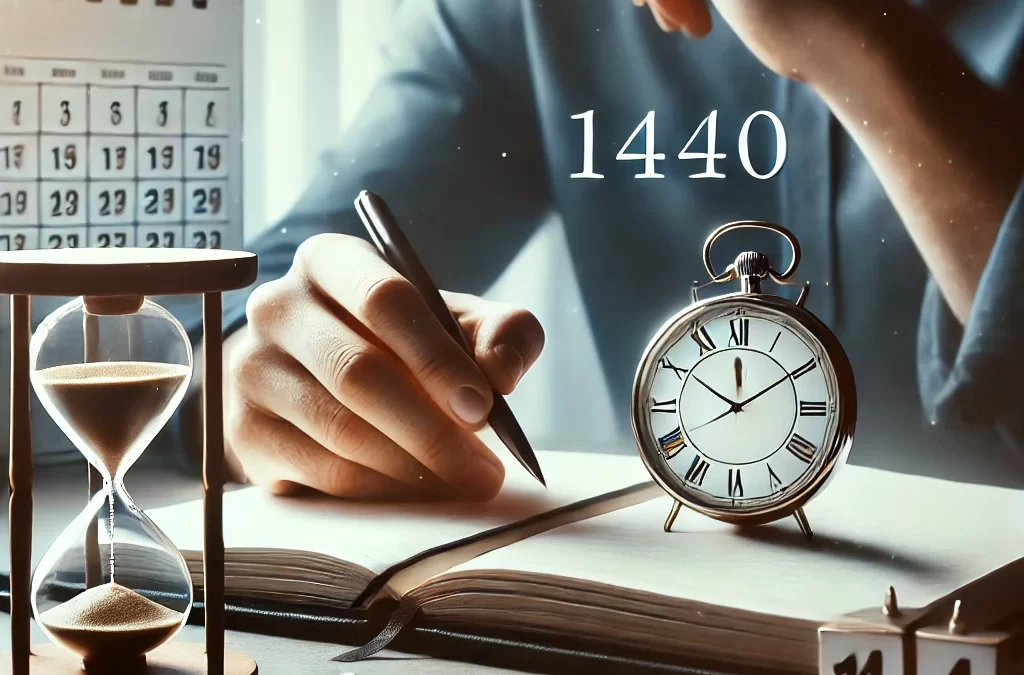We all have the same 1,440 minutes every day, but have you ever thought about how much time you actually spend reflecting on how you use them? Reflection is crucial in mastering your 1440 because it helps you pause, evaluate, and ensure you’re making the most of each day. Without taking the time to reflect, you’re likely running on autopilot, missing out on opportunities for growth, and not using those 1,440 precious minutes as effectively as you could.
Mastering your 1440 starts with self-awareness, and you can’t develop self-awareness without taking time to reflect. In this article, we’ll explore the power of reflection, why it’s crucial for taking control of your time, and how you can incorporate it into your daily routine. By the end, you’ll have some practical tools to help you reflect, refine, and ultimately master your 1440.
Why Reflection is Key to Mastering Your Time
When we talk about “mastering your 1440,” we’re essentially talking about time management—but with a twist. It’s not just about planning your day and setting goals. It’s about ensuring those goals align with your values and priorities. Reflection is the bridge between what you’re doing and why you’re doing it.
Think about it: how many times have you reached the end of a busy day, only to wonder what you actually accomplished? This feeling comes from a lack of intentional reflection. Without stopping to ask yourself if you’re using your time in a way that aligns with your bigger picture, it’s easy to get stuck in reactive mode—constantly putting out fires without ever moving closer to your goals.
By regularly reflecting, you shift from being reactive to proactive. You gain clarity on what’s working and what’s not, allowing you to fine-tune your approach and make smarter choices with your time.
The Connection Between Reflection and Personal Growth
Reflecting on how you spend your time does more than just help you be more productive. It’s a crucial element of personal growth. Consider this: every decision you make, every action you take, reflects your habits, values, and priorities. If you don’t take time to reflect on these elements, you’ll struggle to grow beyond where you are today.
Reflection helps you spot patterns, both positive and negative. Maybe you realize that your mornings are more productive when you take 10 minutes to meditate, or that you tend to waste time scrolling through social media when you’re tired. With this insight, you can make deliberate changes that boost your performance and personal development.
Incorporating reflection into your daily routine is like shining a light on your blind spots. The more aware you become of your tendencies, the better equipped you are to make intentional changes that lead to growth.
Practical Ways to Reflect and Master Your 1440
Reflection doesn’t have to be complicated or time-consuming. In fact, simple, consistent practices can have a huge impact. Here are a few effective ways to incorporate reflection into your routine:
1. Daily Journaling
One of the most powerful ways to reflect is through journaling. At the end of each day, take five minutes to write about what went well, what didn’t, and how you felt. This practice helps you process your day and identify patterns in your behavior. If you’re new to journaling, you might want to check out this guide on effective journaling techniques to get started.
Start with prompts like:
- What was the highlight of my day?
- What did I struggle with today?
- How could I have used my time better?
Over time, this journaling practice will give you valuable insights into how you can optimize your 1440.
2. Morning Check-Ins
Reflection doesn’t always have to happen at the end of the day. Starting your morning with a brief check-in can set the tone for intentional time management. Ask yourself:
- What are my top three priorities today?
- How do I want to feel at the end of the day?
- What challenges might come up, and how can I handle them?
By reflecting on your intentions for the day ahead, you’re more likely to stay focused and aligned with your goals.
3. Weekly Reviews
While daily reflection is essential, taking a step back once a week allows for a more in-depth review of how you’re managing your time. At the end of each week, schedule 15-20 minutes to ask yourself:
- What did I accomplish this week?
- Did I spend my time on what matters most to me?
- What could I do differently next week?
This kind of big-picture reflection helps you stay on track with your long-term goals and ensures that you’re not just busy but productive.
4. Mindful Moments
You don’t need a notebook or an elaborate system to reflect. Sometimes, it’s about pausing throughout the day to check in with yourself. Set a reminder on your phone to take a mindful moment—whether that’s during a coffee break or right before a meeting. Ask yourself:
- Am I spending my time in line with my priorities right now?
- Do I feel focused, or am I getting off track?
These mini-reflections keep you aware of how you’re using your time in real-time, so you can course-correct as needed.
How Reflection Leads to Better Decision-Making
When you make reflection a habit, you’ll start noticing how much easier it becomes to make decisions. This is because reflection builds self-awareness. The more in tune you are with how you spend your time, the more clarity you’ll have when faced with choices.
Let’s say you’re deciding whether to take on a new project. Without regular reflection, you might jump at the opportunity without considering whether it fits into your current priorities. But if you’ve been reflecting on your goals and how you’re already using your time, you’ll be better equipped to weigh the pros and cons.
In this way, reflection acts as a compass, guiding you toward decisions that align with your long-term vision. It helps you avoid overwhelm by ensuring that your commitments match your capacity.
Reflection in Action: A Case Study
To illustrate the power of reflection, let’s look at a real-world example. Meet Sarah, a busy entrepreneur who often found herself overwhelmed by the demands of her growing business. She constantly felt like there weren’t enough hours in the day to get everything done, and by the end of the week, she was exhausted.
Sarah decided to start a daily reflection practice. Each evening, she spent just five minutes journaling about her day. She quickly realized that she was spending too much time on tasks that could be delegated and not enough time on high-impact activities that aligned with her goals.
With this insight, Sarah made some adjustments. She hired a virtual assistant to handle administrative tasks, freeing up her time to focus on strategic growth. By regularly reflecting on her time, Sarah was able to shift from being reactive to proactive, which not only reduced her stress but also helped her business grow faster.
Final Thoughts: The Power of Reflection for Mastering Your 1440
When it comes to mastering your 1440, reflection is a game-changer. It’s the key to moving from “busy” to “purposeful” and ensuring that your time is spent in ways that truly matter. Whether through journaling, morning check-ins, or mindful moments, making reflection a regular part of your routine will help you gain clarity, make better decisions, and ultimately, make the most of every minute.
Don’t let another day go by without taking time to reflect on how you’re using your 1440. After all, you only get one shot at each day—make sure you’re using your minutes wisely.

